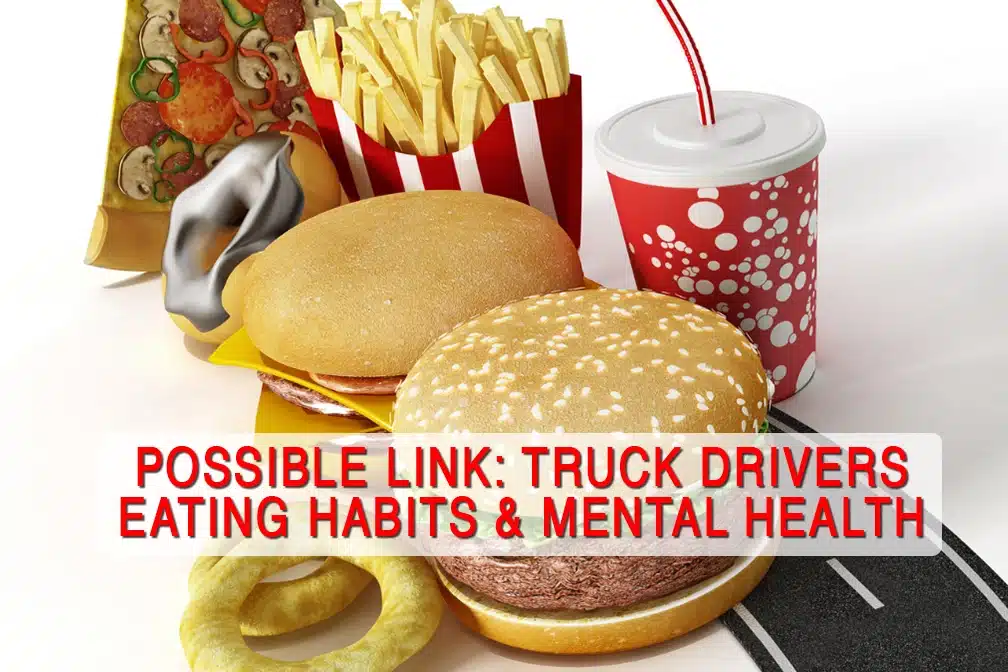Discover Tech Gadgets and Accessories to Support Truckers' Health on the Road. Stay Fit, Eat Well, and Drive Safely with These Essential Tools.
Continue Reading
May 19, 2024 5:06 pm

The life of a truck driver is often romanticized for its sense of freedom and adventure. The reality, however, is that it’s a challenging profession with unique health concerns, particularly when it comes to diet and mental well-being. It’s not just about the long hours behind the wheel; it’s the struggle to maintain a balanced diet and the impact this has on mental health. Recent discussions in the trucking industry are shedding light on how truck driver eating habits can be directly linked to their mental health.
Imagine being on the road for days, sometimes weeks, with limited options for fresh, healthy foods. Truck stops and convenience stores are often the go-to places for meals, but they’re not exactly known for nutritious offerings. The predominance of fast food and processed snacks means that many drivers are consuming high-calorie, high-fat diets, which not only affects physical health but can also exacerbate mental health issues such as depression and anxiety.
The irregular hours and the nature of the job make it challenging to establish a routine, which is essential for a balanced diet. The temptation to reach for sugary snacks and energy drinks for a quick energy boost is high, but these choices can lead to blood sugar spikes and crashes, affecting mood and cognitive function.
The mental health of truck drivers is coming under scrutiny as the connections between diet, lifestyle, and psychological well-being become clearer. Studies have shown that a poor diet can increase the risk of developing mental health disorders. For truck drivers, the stress of the job, combined with loneliness and the responsibility of ensuring cargo is delivered safely and on time, creates a cocktail of stressors that can take a toll.
Eating habits can either be a friend or foe in this environment. Foods high in sugar and fat can lead to inflammation, which is linked to an increased risk of depression. On the other hand, a balanced diet rich in fruits, vegetables, and whole grains can help to reduce this risk and improve overall mood.
The first step towards change is recognizing the link between eating habits and mental health. The trucking industry is taking note and looking at ways to support drivers in making healthier food choices. This includes initiatives to provide better food options at truck stops and educating drivers about the importance of nutrition.
Health programs tailored to the trucking lifestyle are also emerging. These programs encourage drivers to prepare meals in advance, use slow cookers in their trucks, and carry healthy snacks like nuts and fruits. Some companies are even offering incentives for drivers who make lifestyle changes that contribute to better health outcomes.
Employers play a crucial role in the health and well-being of truck drivers. By implementing wellness programs and offering nutrition and mental health resources, they can help drivers make informed decisions about their eating habits. Providing access to health professionals who understand the unique challenges of the trucking industry can also make a significant difference.
Moreover, addressing the mental health stigma in the trucking industry is vital. Creating an environment where drivers feel comfortable discussing mental health issues and seeking help when needed is an essential step in the right direction.
For truck drivers, there are practical steps that can be taken to improve eating habits and mental health. Planning is key; preparing healthy meals before hitting the road can help avoid the trap of convenient but unhealthy food options. Staying hydrated, reducing caffeine intake, and ensuring regular meal times can also help maintain energy levels and mood stability.
It’s equally important for drivers to take breaks, get quality sleep, and engage in physical activity as much as possible. Small changes can lead to significant improvements in both physical and mental health.
The road to better health for truck drivers is not simple, but awareness is growing. As the industry begins to acknowledge and address the link between diet and mental health, there is hope for improvements. By providing the necessary support and resources and by truck drivers taking proactive steps to manage their diet and overall health, the journey towards a healthier life on the road can begin.
The eating habits of truck drivers are a critical but often overlooked factor influencing their mental health. With the trucking industry taking steps to address this issue, there is a collective effort towards positive change. It’s a complex challenge, but by recognizing the importance of diet and mental well-being, drivers, employers, and the industry can work together to ensure the health and safety of those who keep our goods moving.
Discover Tech Gadgets and Accessories to Support Truckers' Health on the Road. Stay Fit, Eat Well, and Drive Safely with These Essential Tools.
Continue ReadingTruck drivers often experience irregular sleep patterns due to several factors inherent in their profession. Here are some reasons why this occurs:
Long working hours: Truck drivers often
Continue ReadingOTR (Over-The-Road) drivers often face challenges in maintaining a healthy lifestyle due to the nature of their job, including limited access to healthy food options, opportunities for
Continue ReadingThe American Trucking Associations (ATA) has expressed strong opposition to the Department of Justice's proposed rule of marijuana reclassification.
Continue ReadingIn an effort to increase efficiency and sustainability in Trucking, Phillips Industries has launched their new, advanced, stick-on solar panels
Continue ReadingThe 2024 CVSA International Roadcheck is scheduled for May 14-16. Over 72 hours, inspectors across the US will conduct nearly
Continue ReadingAutomated License Plate Readers are a major advance in law enforcement technology but they raise significant privacy and oversight challenges.
Continue ReadingThe EPA's latest emission standards detailed in a final rule issued on March 29 are sparking vigorous debate within the
Continue ReadingOOIDA • ATA • DOT • NASTC • WOMEN IN TRUCKING • NPTC • DRIVER RESOURCES • TDN STAFF • ARCHIVES • SITEMAP